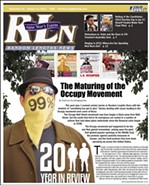Media New Year’s Resolutions for 2006
It’s not much fun to compile a list of new year’s resolutions for yourself. After all, the items are apt to look too familiar and overly demanding. It’s a lot more pleasant to put together a checklist of changes for others to make, if only they can summon enough wisdom and fortitude.
And who could possibly be in more need of guidance for the next year than the big media outlets that have besieged us during the previous 365 days?
In a constructive spirit, therefore, here are some new year’s resolutions for media in 2006.
* Broadcast TV news editors: You don’t have to pad newscasts with so much “lifestyle” reporting and other fluff. Instead, put more effort into tough investigative journalism.
* Public radio executives: With millions of listeners accustomed to the daily national program “Marketplace,” public radio can widen its news repertoire by developing a show called “Laborplace.”
* Daily newspaper editors: Just about every paper has a section called “Business,” where the focus is on CEOs, company managers, profit reports and big-time investors. But a lot more readers are working people -- and a “Labor” section would be a welcome addition to the mix.
* Washington press corps: You know what the conventional wisdom is, but that doesn’t mean you have to be tethered to it. Instead of limiting your reports with overreliance on official sources and the usual assortment of corporate-backed think tanks, develop a much broader range of sources.
* National news editors: Of course there was plenty of poverty all over the United States before Hurricane Katrina slammed into New Orleans. And there’s just as much poverty now, with hurricane news off the front pages. So, instead of sinking back into avoidance-as-usual, resolve to provide extensive ongoing coverage of Americans struggling below the poverty line.
* Editors of the Wall Street Journal editorial page: Take another look at “The Wealth of Nations,” where your hero Adam Smith actually shared insights that you often scorn. As he wrote, “It was not by gold or by silver, but by labor, that all the wealth of the world was originally purchased.” Or consider what the hallowed 18th century economist said about manufacturers and merchants, the kind of special interests your editorials routinely tout as synonymous with the public interest -- “men whose interest is never exactly the same with that of the public, who have generally an interest to deceive and even to oppress the public, and who accordingly have, upon many occasions, both deceived and oppressed it.”
* Local TV news producers: Instead of adhering to the unwritten rule “If it bleeds, it leads,” try concentrating on stories that will let viewers know about what’s really important for the future of their communities.
* Top editors at the New York Times: Lately, you’ve had staggering impacts on history with acts of commission and omission. First you put bogus reports about Iraqi weapons of mass destruction on front pages, and then you waited more than a year before publishing information about domestic spying by the National Security Agency. In the process, the New York Times figured prominently in helping to start a war and also may have affected the results of a presidential election. Now, try to develop institutional remorse for jettisoning basic journalistic principles to the benefit of the Bush administration.
* Editors, People Magazine: The lure of celebrity may be irresistible. But unless you change the name of the magazine to “Famous People,” isn’t it very misleading to convey the assumption that the people most worth reading about are usually movie stars, top-grossing musicians and the like? Work harder at looking for interesting people, regardless of wealth or fame.
* National cable news programmers: You don’t have to spend so much time filling TV screens with the latest grisly story from someplace in America. Reporting a new tragedy is one thing, but fixating on it is another. There can be a lot more to on-the-spot news coverage than chasing police cars and ambulances.
* Bill O’Reilly: Carefully listen to the archival footage in the movie “Good Night, and Good Luck.” If you don’t notice your strong resemblance to Sen. Joseph McCarthy, ask someone who doesn’t work for Fox to explain it to you.
* Judge Judy: Lighten up!
Norman Solomon’s latest book is War Made Easy: How Presidents and Pundits Keep Spinning Us to Death. For information, visit www.WarMadeEasy.com.





